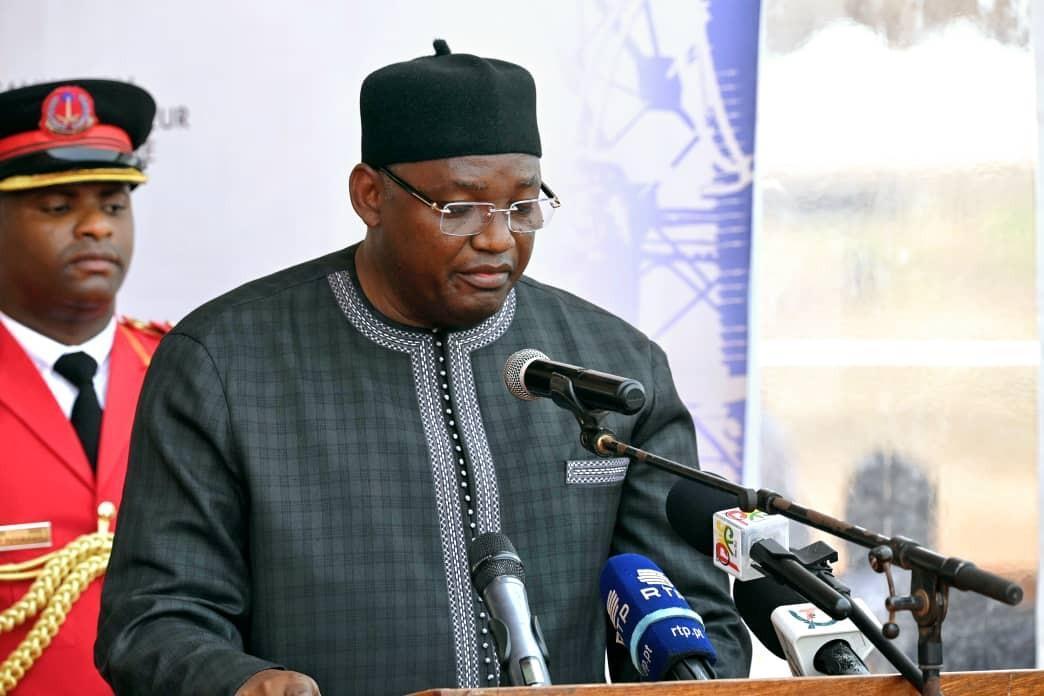By Alkali Dibba
Africa-Press – Gambia. Adama Barrow rose to power in 2017 as the embodiment of hope for a peaceful departure from tyranny, a promise of transformation. But eight years on, many ordinary Gambians feel that “the centre is shaking”: despite reformist rhetoric and visible projects, the lived reality at the grassroots remains a far cry from the leadership’s bold expectations.
Political fault lines: democracy without depth
When Barrow assumed office, he symbolised the restoration of democracy: releasing 171 political prisoners, reining in the National Intelligence Agency, and launching the Truth, Reconciliation and Reparations Commission (TRRC). The media revived, politics pluralised, and civil society regained room to breathe.
Yet promises of deep institutional reform especially constitutional reassessment have faltered. A new draft constitution aka “Barrow Constitution” emerged in August 2024, criticised for omitting clear commitments on presidential term limits while expanding executive power. Senegal’s ECOWAS, once a guarantor of the transition, remains involved as political consensus falters.
Moreover, the disconnect between Banjul’s rhetoric and village realities is palpable. In places like Fonis, tensions simmer; tribalism, hate speech and the heavy-handed deployment of paramilitaries undercut unity rhetoric. Meanwhile, critics allege Barrow’s approach to dissent and media reveals more chaos than control of a leader adrift amid “Banjul mafias and other crooked political junkies reacting defensively rather than pushing principled policy.His actions are not born out of a Machiavellian strategy but rather from the confusion of a leader who seems to be taking direction from a motley crew of political opportunists… a puppet to be manipulated.
In short, the façade of democratic normalcy is intact but the foundations of good governance remain fragile and uneven. The center is indeed shaking.
Economic growth: visible yet hollow for the Many
On paper, Barrow’s tenure has some upbeat numbers to show. The economy rebounded to 5.8 % growth in 2024, with inflation dropping from 17.3 % in 2023 to 10.2 %. Tourism surged, with over 233,411 arrivals in late 2024, projected to reach 263,764. Fiscal transparency improved via digital tax reforms, a $100 million IMF facility, and even a $300 million MCC compact; reforms like IFMIS and the Anti‐Corruption Act 2023 were introduced.
But many Gambians, especially outside the cities, feel little of this progress. Rural poverty, youth unemployment, and inequality persist, thus economic gains appear to be disproportionately enjoyed in Banjul and Kombo, with the countryside still struggling. And there goes another President building mansions in his home town, ‘a must to visit village’ like the one time famous Kanilai under Jammeh. In drove from government officials to your NPP supporters. All hail Mankamankunda they chatted. Alas, Kanilai used to be.
Meanwhile, corruption remains a festering wound: Gambians tolerate misdeeds under the cultural concept of “maslaha,” excusing officials for “communal good,” allowing systemic corruption to fester. Despite Barrow’s anti‐corruption onslaught, Transparency International scores remain middling: 38/100 globally, ranked 96 of 180, well above regional average, yet far from clean.
In effect, while infrastructure like roads, markets, schools, electrification has transformed the physical landscape, economic empowerment at the grassroots remains elusive.
Social strains: disillusion everyday
Socially, Barrow’s early days were defined by renewed liberties and civil vibrancy. But grassroots pessimism has grown. Institutional weakness endures: the judiciary lags on reform; electoral credibility remains questionable; youth see fewer opportunities; marginalized ethnic groups feel side‐lined.
Notably, rural protests like the Faraba Banta shooting (2018), where police fatally shot protesters over mining disputes, left deep emotional scars. Though Barrow ordered a commission of inquiry, visited victims, and suspended mining activities, the incident amplified fears of state insensitivity to ordinary voices.Gala, a youth led anti-corruption movement met with inhumane police crackdown and most of the members unlawfully detained, humiliated, tortured and yet falsely accused of a crime to fight corruption at the court under the watch of a president they risked everything and to have him elected in 2016. Now your inner circle occupy your worst enemies when all genuine citizens rallied behind Coalition and voted out one of Africa’s ruthless dictator of our time.
Moreover, the 2022 coup attempt though swiftly subdued signaled ongoing fragility within the security sector. At a deeper level, Gambians at the grassroots feel their lives are unchanged, a land troubled by youth disengagement, limited job prospects, unequal development, and distant governance.
Conclusion: reclaiming transformation that matters
“Things are falling apart, and the centre is shaking” might well be the lament of many Gambians today. The Barrow government’s achievements such as democratic restoration, infrastructure, and macro stability are undeniable. Yet the social compact remains frayed: corruption lingers, rural welfare stagnates, political inclusivity is shallow, and institutional reform stalls.
To heal the cracks and restore promise at the grassroots, the administration must:
1. Accelerate constitutional reform that clearly enshrine term limits, strengthen checks and balance, and assuage fears of power concentration.
2. Tackle corruption culturally and structurally beyond legislation and shift norms that tolerate malfeasance.
3. Deliver equitable economic opportunity by investing in rural livelihoods, youth entrepreneurship, and diversification beyond tourism.
4. Institutionalise justice and accountability by following through on TRRC recommendations and build independent, capable institutions
5. Reengage the populace through grassroots forums, inclusive governance, and responsiveness to local grievances like Faraba Banta.
Barrow’s leadership still holds the potential to be transformative not just infrastructurally or diplomatically, but fundamentally for the average Gambian. But time is finite; unless the centre holds and extends its reach to every Gambian, disillusion will deepen and the promise of change will slip further away. Most importantly, listen more to the critics and concerns from your opponents and less to your perceived friends and supporters, for it’s the wisdom of a good leader.
For More News And Analysis About Gambia Follow Africa-Press






